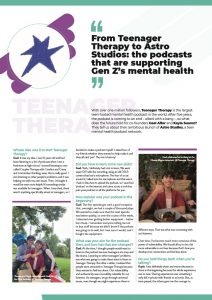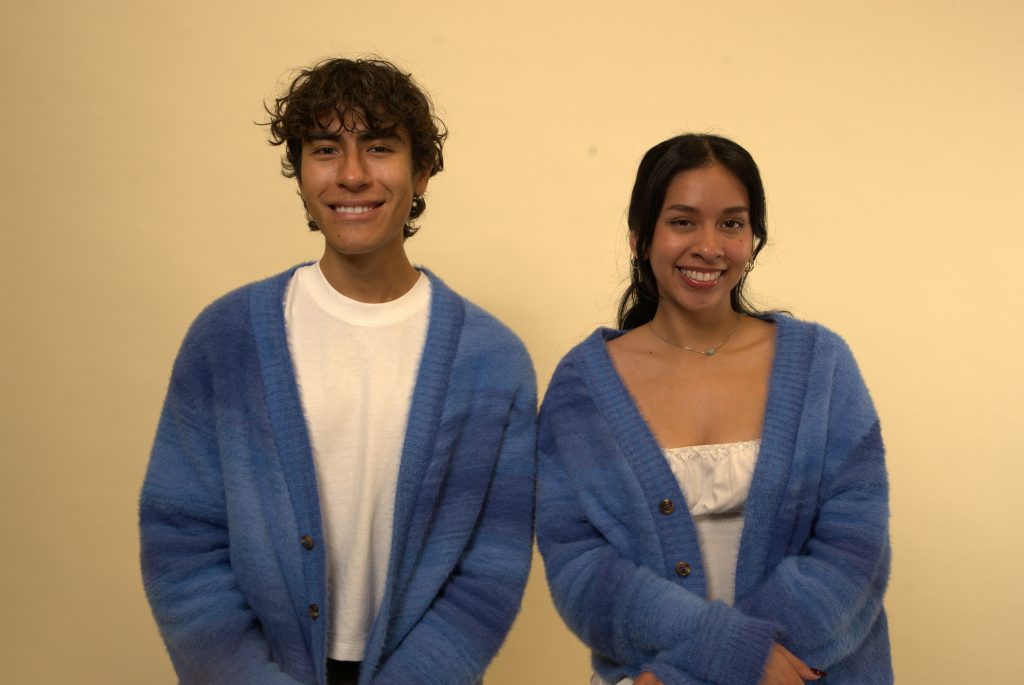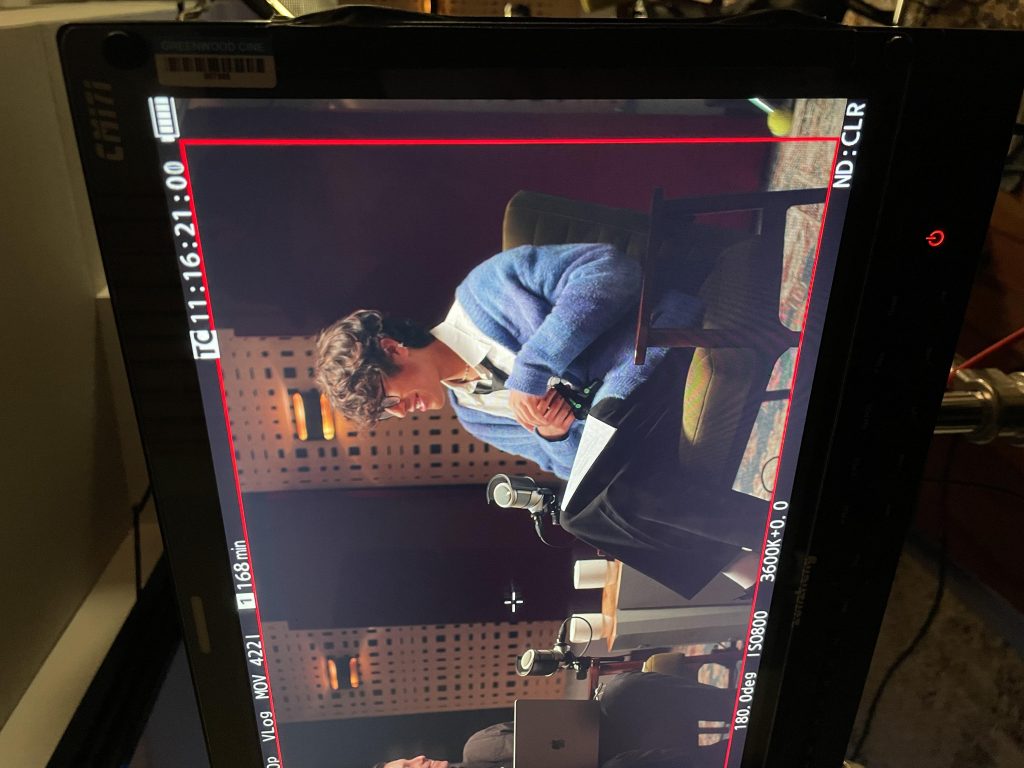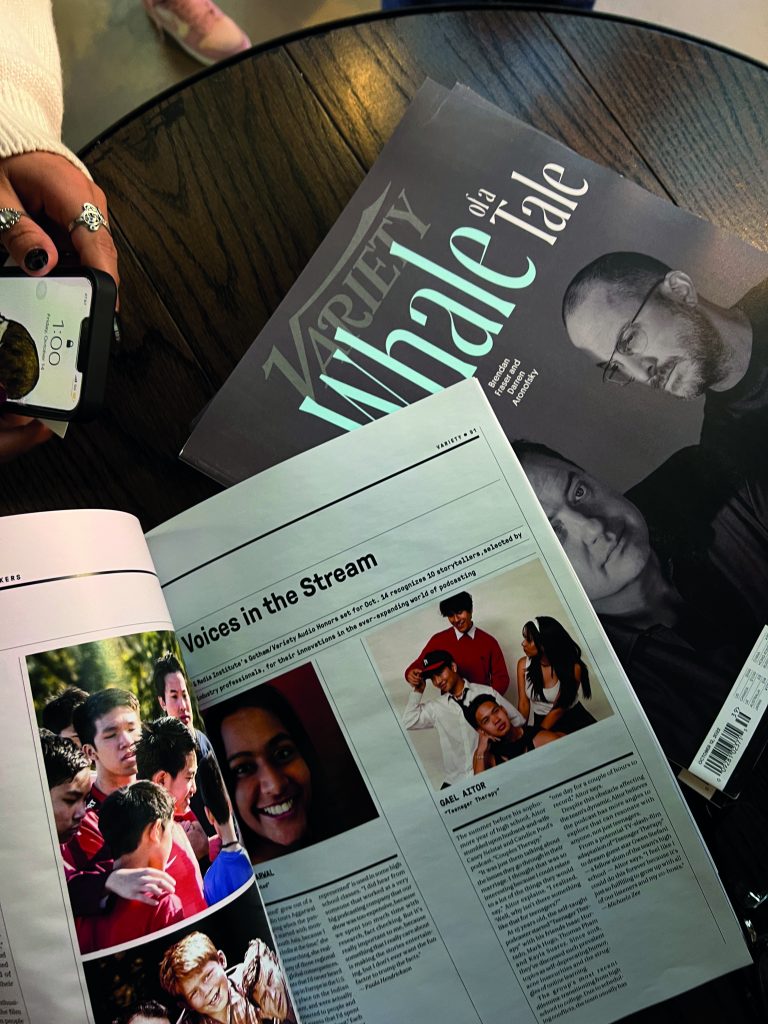From Teenager Therapy to Astro Studios: the podcasts that are supporting Gen Z’s mental health
With over one million followers, Teenager Therapy is the largest teen-hosted mental health podcast in the world. After five years, the podcast is coming to an end – albeit with a bang -, so what does the future hold for co-founders Gael Aitor and Kayla Suarez? They tell us about their ambitious launch of Astro Studios, a teen mental health podcast network.
Whose idea was it to start Teenager Therapy?
Gael: It was my idea. I was 15 years old and had been listening to a lot of podcasts when I was a freshman at high school. I started listening to one called Couples Therapy with Candice and Casey and I remember thinking, wow, this is really good. I was listening to other people’s problems, and it was helping me with my own issues. Then, I thought it would be even more helpful if something similar was available for teenagers. When I searched, there wasn’t anything specifically aimed at teenagers, so I decided to make a podcast myself. I asked four of my friends whether they wanted to help make it and they all said, yes. The rest is history!
Did you have to learn some new skills?
Gael: Yeah, I definitely had a lot to learn. We went super DIY with the recording, using an old DSLR camera that had a microphone. The four of us sat around it, talked into the microphone and that was it. I had no idea how to upload the podcast, so I searched ‘podcast’ on the internet and came across a tool that puts your podcast on all the platforms for you.
How popular was your podcast in the beginning?
Gael: The first episode got such a good reception that, overnight, we had a couple of thousand plays. We wanted to make sure that the next episode was better quality, so over the course of the week, I obsessed over getting better equipment – better but cheap. I remember everyone telling me not to buy stuff because we didn’t know if the podcast was going to do well, but I was sure it would, and I bought the equipment.
What was your aim for the podcast then, and how has that aim changed?
Gael: At the time, I thought people would want to listen to the podcast because teenagers are nosy and like drama. Listening to other teenagers’ problems was what was going to make them want to listen to Teenager Therapy. But after a while, I realised that people were attracted to Teenager Therapy because they wanted to feel less alone. Our vulnerability and authenticity were incredibly relatable for our listeners. As teenagers, we go through universal issues, even though we might experience them in different ways. That was what was resonating with our listeners.
Over time, I’ve become much more conscious of the power of vulnerability. We should all try to be a bit more vulnerable in our lives because that’s how you develop true connections and feel less alone.
Do you hold things back when you’re talking?
Kayla: I was definitely shyer and more reluctant to share in the beginning because the whole experience was so new. Sharing experiences was something I only did in private with friends or at home. But, as time passed, the others gave me the courage to speak out because they were sharing their stories, and it only seemed right that I share mine. Now, I’ve reached a point where I feel comfortable talking about my experiences. We’re essentially in our friend’s bedroom, talking. I don’t like to think of the thousands of listeners we have when we’re recording, though, because then I tend to filter what I’m saying.
How do you decide what to talk about in each episode?
Gael and Kayla pose for Astro Studios.
@ Astro Studios
@ Teenager Therapy
Audio Honors award. @Teenager Therapy
Kayla: Honestly, we usually decide on the day. Before recording, we talk about what’s been going on in our lives, what’s new, our feelings and, from there, come up with ideas for the episode.
Which is your favourite podcast episode, so far, and why?
Gael: There is one that I think fully encompasses what we do and why, which is about being as authentic as possible. In this episode, we started arguing – it was an explosion of resentment and feelings that came up during the recording. You can hear us trying to communicate effectively and then fail. We had to end early because tensions were so high. For me, that episode is one of my favourites, not because it was enjoyable but because it is so unique.
Kayla: One of the more recent episodes that stands out to me was about the issues and emotions we face as first-generation students. I was transitioning into college and it was affecting me a lot. We uploaded some clips to Tik Tok, and they got a lot more views than usual. I remember feeling relieved, because it meant other people are going through this, too, because, at the time, it didn’t feel like I, as a first-gen student, was relating to many people at school.
Is there a concern that keeps cropping up among teens?
Kayla: The way I view it is that there is a jumble of emotions in all areas of one’s life that ultimately result in loneliness. It’s hard to feel like other people understand what you’re going through or that they fully recognise you as you are, which then makes it harder to connect with people. Social media is a double-edged sword in the sense that it can bring people together, and serve as a sense of community, but it’s all digital. You don’t have that face-to-face connection and interaction, and this is isolating.
Social anxiety is also a lot more common. There are many things to battle when you finally do decide, okay, I want to put myself out there. If you do want to overcome loneliness, you have to have the confidence in yourself to take a chance. You never know what connections are out there.
Gael: It almost feels like talking to people in person isn’t allowed anymore, and the constant patrolling on the internet is making it worse. Before the internet, people approached people and asked them whether they wanted to go out. Now, people are overthinking even the smallest of interactions. What if the person doesn’t want to be bothered? What if this is considered harassment? I think this is driving the loneliness epidemic because we’re unable to bring our online connections into the real world; we’re unable to establish real-world connections because we’re scared of approaching people.
What is your advice for young people who are feeling lonely and disconnected?
Gael: It begins with a mindset shift. You can talk to anyone. It’s flattering to be approached. You may experience rejection, but rejection is part of life, and the more you go through life being okay with rejection, the more fulfilling your life will be. You’ll stumble across some really cool people if you put yourself in situations where you might be rejected.
What’s next for Teenager Therapy?
Gael: Teenager Therapy is coming to an end in September 2023, coinciding with five-year anniversary. We’re all going to be 20 years old and we feel we’ve outgrown the brand. We want to go out with a big bang, so who knows what we’ll do for our final episode!
You have recently launched Astro Studios. Are there personal reasons for your interest in mental health?
Gael: A lot of the work I do is mission-driven-I’ve never been profit-driven. When I think about what I’m going to make, I don’t think about how much money it’s going to create, I think about what kind of impact I want to have. I’ve realised that what has made Teenager Therapy so fulfilling is the impact it’s having. It’s the same for Astro Studios. I want to create a space for teenagers to turn to when they’re dealing with overwhelming emotions. I went through an emotional crisis at one point in my life, and I didn’t know how to handle it, or how I was supposed to feel. I remember thinking, how are others dealing with this? I wanted to hear about the experiences of other young people and that’s the driving force behind the shows we make at Astro Studios.
Kayla: When I was a kid in middle school, I didn’t know that the term ‘mental health’ existed, and this is particularly true for underrepresented people. My nephews are teens, and I think about how they’ll be needing help at some points in their lives, but they won’t be asking for or talking about it. When I think about this on a much larger scale, affecting thousands and thousands of people, I recognise that teens need an outlet, somewhere to go. Astro Studios will become that place.
Do you have an idea of where you want your studies or career to take you?
Kayla: I don’t know if this sounds bad or not, but I’m not actively trying to excel academically. I’m majoring in business, so it feels right to be gaining experience, rather than focusing on theory, which is why I’m so excited to see where Astro takes us. I want to finish my studies because, for me, school is a personal accomplishment. My family doesn’t come from educational or college background. I also recognise that if Astro doesn’t take off and I need to redirect my attention, I may have to consider different routes.
Gael: I’ve been an entrepreneur since I was 12 years old. I created my first e-commerce clothing company at 13 and grew that to $100,000 in sales by the time I was 14. I was born in Mexico and emigrated to the US when I was 6. I didn’t speak English and lived with my single mom and sister. My mom didn’t finish college either. For me, my focus is on growing Astro Studios to hopefully become a successful company and retire after that.
About Astro Studios
As the five friends prepare for the big bang for Teenager Therapy, Gael and Kayla have been working on a new project. Launched in May 2023, Astro Studios is a teen mental health start-up providing on-demand access to professional and specialised therapists. At present, it works as a podcast network, which teens can access through a single subscription, but Gael and Kayla have much bigger plans for its development. “This is step one of a hundred steps to where we want to go with Astro Studios,” says Gael. “We’re reimagining the mental healthcare system and how social media and software can be a supporting pillar.”
Although Astro Studios is separate from Teenager Therapy, Gael and Kayla describe it as a more mature and scaled-up version of it. “For example, we’ll focus on love, and how to deal with a breakup, but instead of covering this in one episode, we’ll have a full podcast series dedicated to love and each episode will focus on one person’s perspective.” The aim is for listeners to be able to select from a wide range of experiences and perspectives, with each interview being between 10 and 15 minutes long.
According to the UK National Health Service (NHS), one in six young people aged between 5 and 16 in England experienced a mental health problem in 2020, up from 1 in 9 in 2017. In the US, young adults aged from 18 to 25 are reported to have experienced more mental health concerns (30.6%), compared to adults aged 26 to 49 years, and the highest rate of serious mental illness (9.7%). “There is a mental health crisis and we’re in a loneliness epidemic,” says Gael. “A lot of the traditional approaches don’t consider all the varying factors that need to come together for there to be an effective solution. I think modern teens think about their mental health in a different way, and that means encompassing media. Astro Studios will use media to provide a community for young people.”




